Morocco Language
Table of Contents
You might be surprised to learn that Morocco is home to a rich tapestry of languages. Multiple dialects and languages are spoken across the country. This shows the country’s history, cultural heritage, and where it’s located.
Exploring the Moroccan linguistic landscape reveals more than one language. Instead, you find many dialects and languages living together and influencing each other.
Key Takeaways
- The linguistic diversity of Morocco is shaped by its history and cultural heritage.
- Multiple languages and dialects are spoken across the country.
- Understanding the local languages can enhance your experience when interacting with Moroccans.
- The country’s linguistic landscape is complex and multifaceted.
- Language plays a crucial role in shaping Moroccan identity.
The Linguistic Landscape of Morocco
Morocco’s language scene is a rich mix of history. It sits at the crossroads of Africa, Europe, and the Arab world. This makes it a place where many languages and cultures meet.
Historical Evolution of Languages in Morocco
The history of languages in Morocco is complex. It has been shaped by ancient civilizations and colonial powers.
Ancient Influences on Moroccan Languages
Berber languages and Phoenician have had a big impact on Morocco’s languages. They have helped create unique dialects and expressions that people still use today.
Colonial Impact on Language Development
The colonial era changed Morocco’s languages a lot. French and Spanish were brought in for administration and education. Today, many Moroccans speak French as a second language.
Cultural Significance of Multilingualism
Multilingualism is key to Moroccan culture. It shows the country’s history and identity. The mix of languages has made Moroccan society richer, with more ways to express and communicate.
- Using many languages helps with cultural exchange and understanding.
- Multilingualism lets Moroccans connect with different cultures and communities.
- The mix of languages has led to unique cultural expressions, like literature and music.
Official Languages of Morocco
The official languages of Morocco show the country’s rich culture. Arabic and Amazigh are key. Morocco’s language identity comes from its history, geography, and diversity.
Modern Standard Arabic: The Primary Official Language
Modern Standard Arabic is Morocco’s main official language. It’s used in government, schools, and formal events. This form of Arabic is common across the Arab world, helping Arabs communicate.
In Morocco, Arabic is taught in schools and used in official settings. It’s also found in media and literature.
Amazigh (Berber): The Indigenous Official Language
Amazigh, or Berber, is another official language of Morocco. It’s spoken by the Amazigh people in various regions. There are efforts to standardize Amazigh, making it part of education and some media.
Recognizing Amazigh as an official language helps keep Morocco’s cultural heritage alive.
The Role of French in Moroccan Society
French is not an official language but is very important in Morocco. This is because of the country’s colonial past. It’s used in business, education, and government, helping with international communication.
Many Moroccans speak French, making it useful for economic and cultural exchange.
In summary, Morocco’s official languages, Arabic and Amazigh, are crucial to its identity. French also plays a big role, showing Morocco’s complex language scene.
Understanding Darija: Moroccan Arabic
In Morocco, Darija, or Moroccan Arabic, is key for daily talks. It’s used in everyday chats, from souks to family meetings.
Distinctive Features of Darija
Darija is different from Modern Standard Arabic. It’s used in informal settings, unlike Modern Standard Arabic for formal ones. Darija is the language of the home and streets.
Regional Variations in Moroccan Arabic
Darija changes from place to place. Urban areas have their own version, unlike rural ones. For example, Casablanca and Marrakech have different Darija.
Common Expressions and Their Cultural Context
Learning Darija phrases gives insight into Moroccan culture. Let’s look at some common greetings and phrases.
Everyday Greetings
In Morocco, greetings are important. Saying “As-salamu alaykum” (Peace be upon you) is common. The reply is “Wa alaykum as-salam” (And upon you be peace).
Social Phrases and Their Meanings
Phrases like “Shukraan” (Thank you) and “Afwan” (You’re welcome) are used a lot. Knowing when to use them helps in social situations.
| Phrase | Meaning | Context |
|---|---|---|
| As-salamu alaykum | Peace be upon you | Greeting |
| Wa alaykum as-salam | And upon you be peace | Response to greeting |
| Shukraan | Thank you | Expressing gratitude |
| Afwan | You’re welcome | Responding to thanks |
The Berber Languages of Morocco
In Morocco, Berber languages are more than just a way to talk. They are a sign of identity and pride. These languages have been around for centuries, adding to the country’s rich culture.
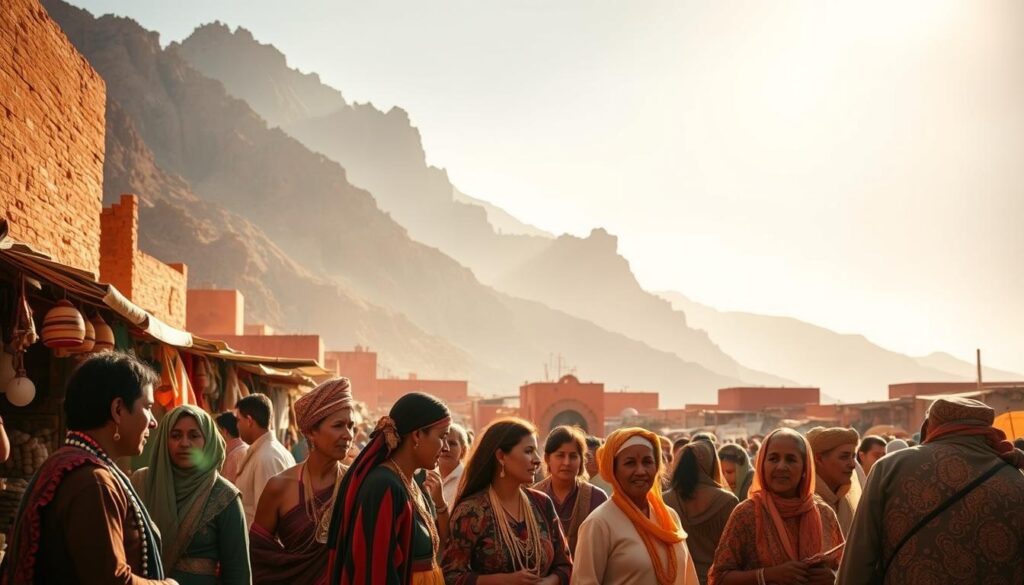
The Berber languages, also known as Amazigh languages, are varied with many dialects. Knowing these languages helps us truly understand Moroccan culture.
Tarifit, Tamazight, and Tashelhit: Regional Distinctions
Morocco boasts several Berber languages, with Tarifit, Tamazight, and Tashelhit leading the way. Each has its own special way of speaking, depending on the region. Tarifit is mainly spoken in the Rif, Tamazight in the Middle Atlas, and Tashelhit in the High Atlas and Souss.
These differences show the rich cultural practices and histories of the Berber people.
Learning Basic Berber Phrases
Learning a few basic Berber phrases can really help you connect with the local culture. Saying “Hello” (Azul), “Thank you” (Tanmirt), and “Goodbye” (Ar timlilit) shows respect for their traditions. It makes your interactions more meaningful and helps you appreciate their culture more.
Cultural Importance of Berber Languages
The Berber languages are key to Morocco’s cultural heritage. They show the history and identity of the Berber communities. It’s important to keep these languages alive for Morocco’s cultural diversity.
By learning about and valuing the Berber languages, you help preserve an important part of Moroccan identity.
In conclusion, the Berber languages of Morocco are a big part of the country’s culture. Their unique features, the value of learning basic phrases, and their cultural importance all add to Morocco’s rich cultural mix.
Essential Phrases for Travellers in Morocco
When you travel to Morocco, knowing local phrases is key. The country speaks Modern Standard Arabic, Amazigh (Berber), and French. But, learning Moroccan Arabic (Darija) and Berber phrases is best for talking to locals.
Greetings and Polite Expressions
Greetings are vital in Moroccan culture. The right ones can make your interactions positive.
Morning, Afternoon and Evening Greetings
In Morocco, greetings change with the day. “As-salamu alaykum” (Peace be upon you) is used anytime. “Sbah l’khir” (Good morning) and “Masaa l’khir” (Good evening) are for morning and evening.
Expressing Gratitude and Respect
Being thankful is important in Morocco. Say “Shukraan” (Thank you) and “Afak” (Please). Showing respect, especially to elders, is also key.
Navigating and Transportation Vocabulary
To get around Morocco, knowing transport words is crucial. Phrases like “Wain kayna…?” (Where is…?) and “Kifach ndir l…?” (How do I get to…?) help a lot.
| English | Moroccan Arabic (Darija) | Berber |
|---|---|---|
| Where is the nearest bus stop? | Wain kayna l-bus? | Manik iga bus? |
| How much is the ticket? | Bshhal had l-taksa? | Menigh tassa? |
Dining and Shopping Terminology
Dining and shopping are big parts of Morocco. Knowing how to order food and bargain can make your trip better.
Ordering Food and Drinks
When ordering, say “Ana baghi…” (I would like…) followed by what you want. For example, “Ana baghi had l-kuskus” (I would like couscous).
Bargaining in Markets
Bargaining is common in Moroccan markets. Start with “Shhal fhad?” (How much is this?) and then negotiate.
Learning these phrases will improve your Morocco trip. You’ll navigate better and connect with locals more deeply.
Morocco Language Translation Tips
Exploring Morocco’s lively streets gets easier when you learn the local languages. Arabic, Berber, and French are the main ones. But, with the right tools and tips, you can break down language barriers and dive deeper into the culture.
Useful Translation Apps and Resources
Today, translation apps are key for travellers. Google Translate and iTranslate give you instant translations. Also, carrying a phrasebook or using online tools to learn basic phrases in Arabic, Berber, and French can be very helpful.
Navigating Language Barriers
Even with good preparation, language barriers can still be tough. Here are some tips to help you get through:
Using Visual Communication
Visual tools like maps, gestures, and pointing work well. Many Moroccans know basic English, especially in tourist spots, which can help a lot.
Simple English as a Backup
Simple English can often get your point across. Try to avoid complex sentences or idioms that might confuse people.
When and How to Find an Interpreter
In cases like medical emergencies or complex deals, getting an interpreter is key. Look for local guides, hotel staff, or translation services for help. Many tourist info centres also offer translation or can suggest local interpreters.
| Situation | Recommended Action |
|---|---|
| Medical Emergency | Seek help from hotel staff or local guides to find an interpreter. |
| Complex Transactions | Use a translation service or ask for assistance at a tourist information centre. |
| General Communication | Use translation apps or carry a phrasebook. |
Language Etiquette in Morocco
Effective communication in Morocco is more than just speaking the language. It’s about understanding the local culture and customs. Knowing these will make your interactions with the Moroccan people much better.
Respectful Communication Practices
When talking to locals, always be polite. Use formal titles like “Mr.” or “Mrs.” followed by their surname. Saying “Shukraan” (thank you) and “Afwan” (you’re welcome) shows respect and can build good relationships.
Key phrases to use:
- As-salamu alaykum (peace be upon you) – a common greeting
- Shukraan (thank you)
- Afwan (you’re welcome)
Gestures and Body Language
Non-verbal cues are as important as words in Morocco. People use gestures to mean things. Knowing these can help you get along better in social situations.
| Gesture | Meaning |
|---|---|
| Right-hand handshake | A common greeting, especially among men |
| Direct eye contact | Signifies respect and sincerity |
| Smiling | Indicates friendliness and approachability |
Cultural Taboos to Avoid
Knowing what not to do is important to avoid offending people. Don’t use your left hand to give or receive things, as it’s seen as impolite. Also, avoid showing too much affection in public.
By understanding these language etiquette tips, you’ll have a better time exploring Morocco. It’s all about being respectful and aware of local customs.
How to Master Morocco Language for Your Trip
Getting ready for your trip to Morocco? Learning the local language can make your visit better. Morocco has a rich mix of languages. Knowing them can help you enjoy the culture more.
Recommended Language Courses and Resources
Start with online courses or apps like Duolingo for Moroccan Arabic. There are also websites and YouTube channels for learning Moroccan Arabic and Berber languages.
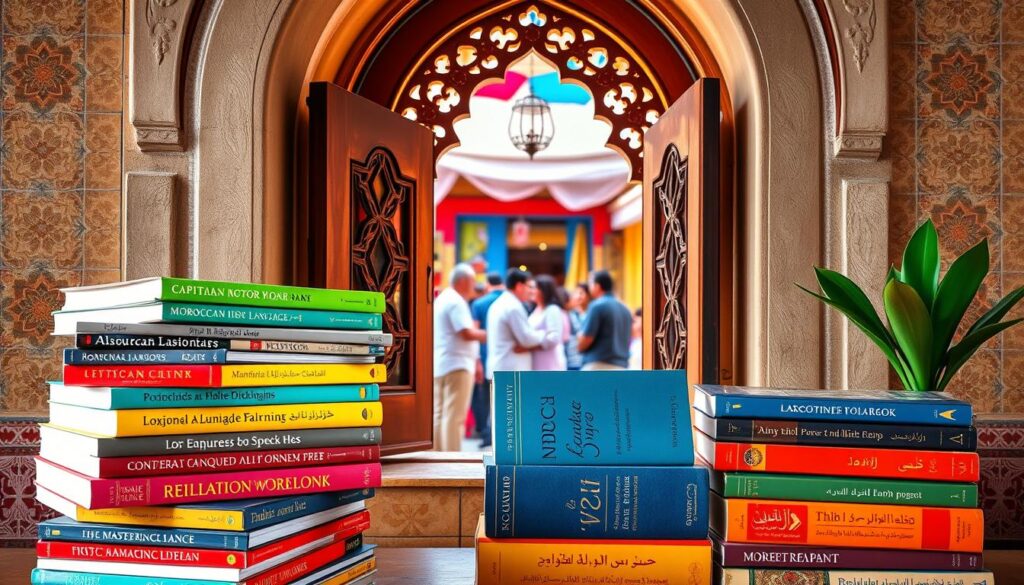
Practical Learning Strategies
Listen to Moroccan music and watch Moroccan movies. Practice with native speakers too. Flashcards can help you remember important words and phrases.
Setting Realistic Language Goals
Set goals like learning basic greetings and phrases. Practice regularly. Remember, making mistakes is part of learning.
Follow these tips to master Morocco’s language. It will make your trip even more enjoyable.
Conclusion: Embracing Linguistic Diversity in Morocco
When you’re getting ready for your trip to Morocco, knowing the languages spoken there is key. Morocco’s language scene is rich, with many languages and dialects living together. You’ll find Modern Standard Arabic, Amazigh (Berber), and Darija, which all show the country’s cultural depth.
By diving into this language mix, your trip will be better. You’ll get to know the locals and really feel the Moroccan culture. Learning a few basic phrases in local languages shows respect and makes your visit more fun and rewarding.
Walking through Marrakech’s lively streets or visiting historic cities, being open to local languages and customs is important. Morocco’s language variety is a big part of its identity. By embracing it, your trip will be one you’ll always remember.

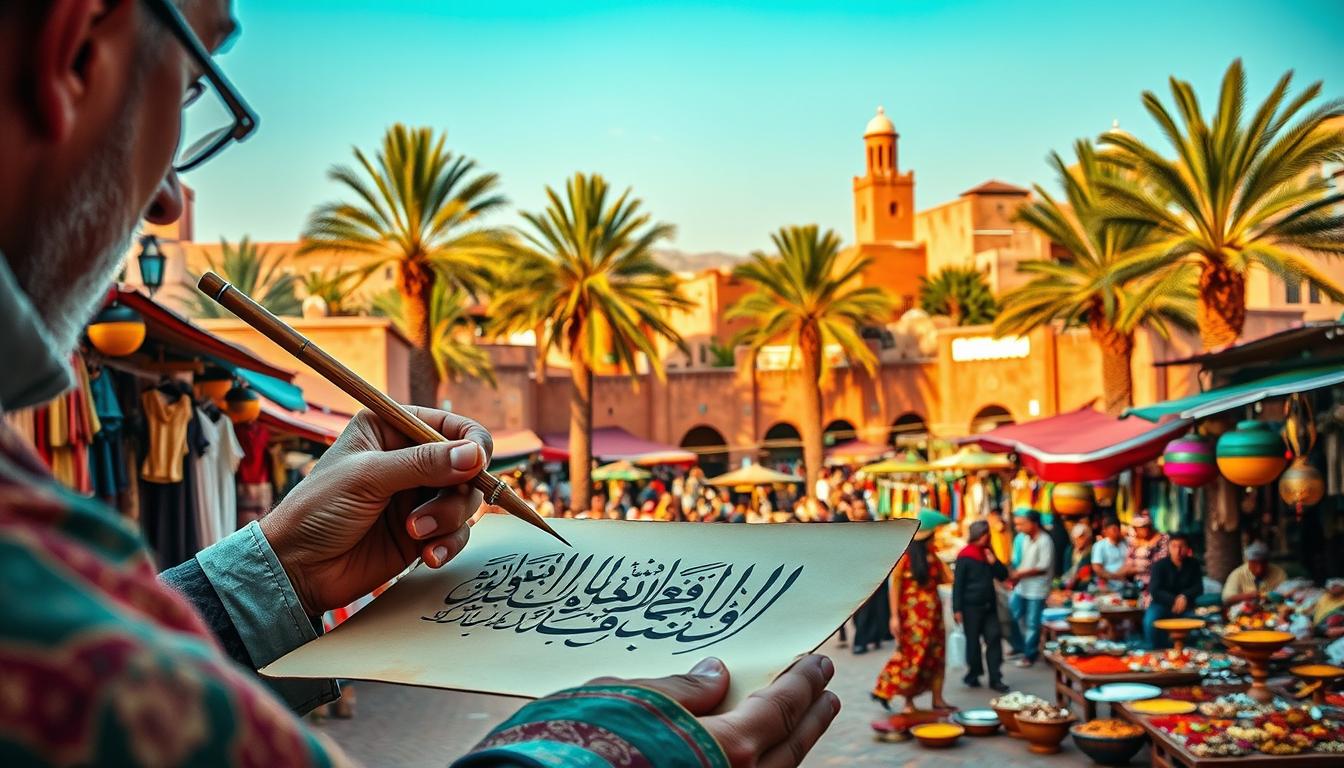
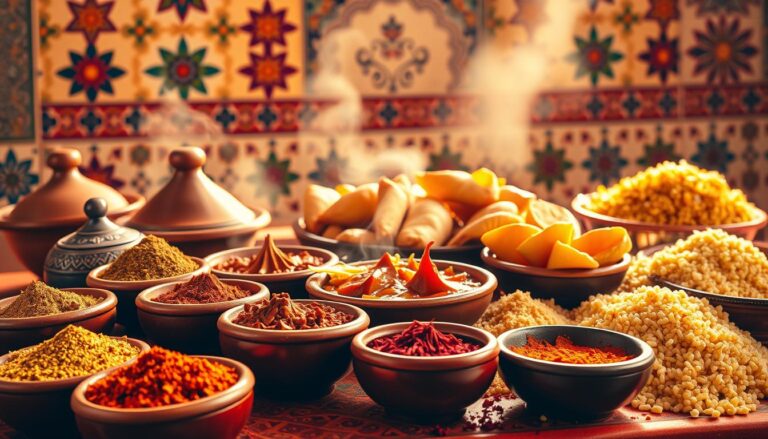
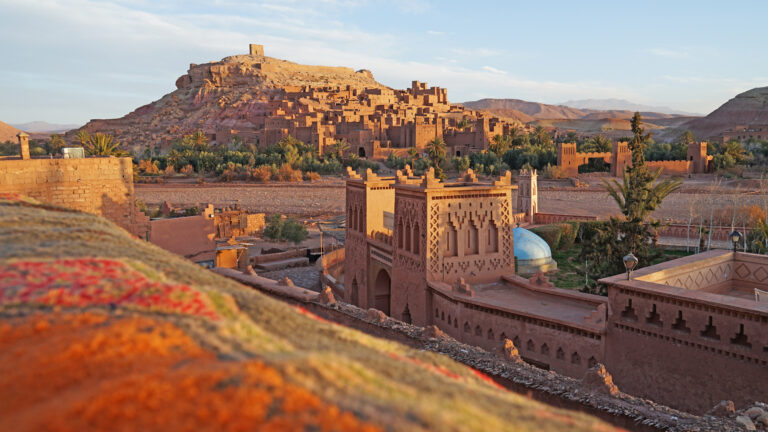

One Comment